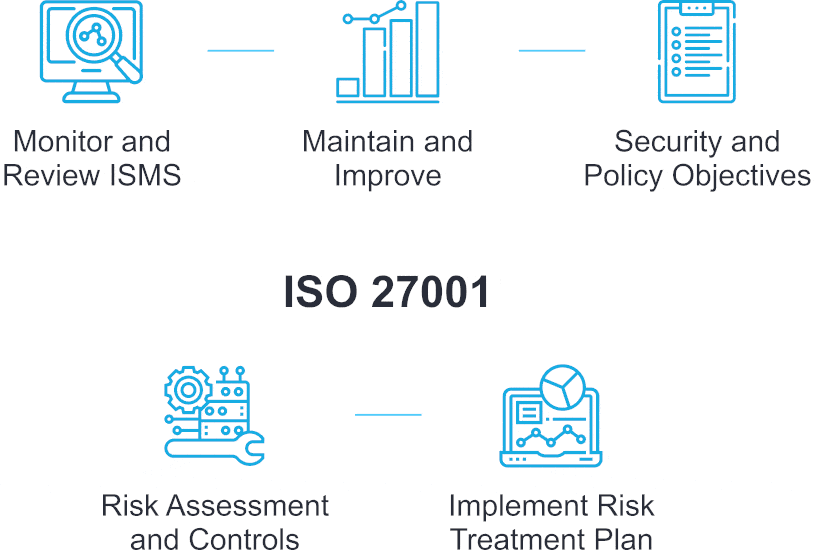ISO 27001 implementation and certification
FAQ
ISO 27001 is an international standard that outlines requirements for an Information Security Management System (ISMS). Key aspects include:
- Provides a framework for managing and protecting sensitive information
- Uses a systematic approach to risk management
- Covers various security aspects:
- Asset management
- Access control
- Business continuity planning
- Communication security
- Compliance
- Cryptography
- Human resources security
- Incident management
- Information security policies
- Organizational structure
- Physical and environmental security
- Risk assessment
- Security controls
- Supplier relationships
ISO 27001 is applicable to organizations of all sizes and industries, helping to protect information from unauthorized access, disclosure, modification, destruction, or disruption.
To obtain ISO 27001 certification, organizations should follow these steps:
- Conduct a gap analysis
- Develop an Information Security Management System (ISMS)
- Conduct a risk assessment
- Implement security controls
- Conduct internal audits
- Obtain certification from an accredited body
- Maintain certification through ongoing audits and improvements
ISO 27001 compliance involves:
- Adhering to the standard's requirements for information security practices
- Implementing and maintaining an effective ISMS
- Regular review and improvement of security practices
- Conducting risk assessments and implementing appropriate controls
- Employee training on information security
- Regular internal audits
Benefits of compliance include:
- Demonstrated commitment to information security
- Assurance to stakeholders of effective information asset management
- Potential reduction in security breaches and associated costs
Implementing ISO 27001 involves these key steps:
- Define the scope of the ISMS
- Conduct a comprehensive risk assessment
- Develop a risk treatment plan
- Create and implement policies and procedures
- Conduct employee training
- Perform regular internal audits
- Continually monitor and improve the ISMS
Note: Implementation can be complex and may benefit from external expertise.
Key benefits of ISO 27001 include:
- Enhanced information security
- Compliance with legal and regulatory requirements
- Improved customer confidence
- Competitive advantage
- Reduced risk of information security breaches
- Potential cost savings from avoided security incidents
Implementing ISO 27001 demonstrates an organization's commitment to protecting information assets and can lead to improved overall security posture, reputation, and operational efficiency.
The cost of ISO 27001 certification varies based on several factors:
Key cost components:
- Consultant fees (if external help is needed)
- Internal resource allocation
- Certification body fees
- Maintenance costs (ongoing audits)
Cost range:
- Smaller organizations: A few thousand dollars
- Larger, complex organizations: Tens of thousands of dollars or more
Note: Costs should be weighed against potential benefits such as improved security, increased customer confidence, and reduced risk of breaches.
ISO 27001 certification is important for several reasons:
- Demonstrates commitment to information security
- Provides assurance to stakeholders
- Enhances reputation and competitive advantage
- Helps meet regulatory and legal requirements
- Reduces the risk of information security breaches
These benefits contribute to an organization's overall security posture, trustworthiness, and risk management capabilities.
Organizations pursue ISO 27001 certification for various reasons:
- Demonstrate commitment to information security
- Provide assurance to stakeholders
- Enhance reputation and gain competitive advantage
- Meet regulatory and legal requirements
- Reduce the risk of information security breaches
ISO 27001 certification can positively impact an organization's:
- Information security posture
- Reputation
- Bottom line
This makes it a valuable investment for many organizations seeking to improve their overall security and risk management practices.
The time to achieve ISO 27001 certification varies based on several factors:
Influencing factors:
- Organization size and complexity
- Level of preparedness
- Availability of internal resources
Average timeframe: 6 to 18 months
Process stages:
- Initial gap analysis
- ISMS development and implementation
- Internal audits
- Management reviews
- External certification audit
Note: Smaller organizations with simpler information systems may complete the process more quickly than larger, more complex organizations.
Organizations should plan for a comprehensive implementation process and allocate sufficient time and resources to ensure a thorough and effective ISMS implementation.

